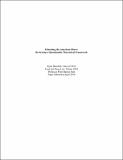| dc.contributor.advisor | Peter Hutt | en_US |
| dc.contributor.author | Buschell, Ryan | |
| dc.date.accessioned | 2012-06-03T11:22:06Z | |
| dc.date.issued | 2010 | |
| dc.identifier.citation | Ryan Buschell, Educating the American Obese: Reviewing a Questionable Theoretical Framework (April 2010). | en_US |
| dc.identifier.uri | http://nrs.harvard.edu/urn-3:HUL.InstRepos:8822185 | |
| dc.description.abstract | This paper will examine the history and recent development of anti-obesity programs adopted in the United States and abroad. The paper will pay particular attention to the theoretical premises on which each initiative relies, identifying two general ideological categories: (1) information campaigns that assume obesity rates are high at least partially because people do not know how or why it is important to live a healthy lifestyle, and (2) programs that rely on direct government intervention in order to make unhealthy lifestyle choices more difficult or more costly. After discussing the impact of the United States’ campaigns, which have largely relied on educational programs to reverse historic obesity rates, the paper will suggest that direct intervention programs like those implemented by some foreign countries may be the more appropriate course. The paper will conclude with a specific proposal to enlarge the role of the FDA in order to facilitate experimentation with anti-obesity programs among state and local governments. | en_US |
| dash.license | LAA | |
| dc.subject.other | Food and Drug Law | en_US |
| dc.title | Educating the American Obese: Reviewing a Questionable Theoretical Framework | en_US |
| dc.type | Paper (for course/seminar/workshop) | en_US |
| dc.date.available | 2012-06-03T11:22:06Z | |


